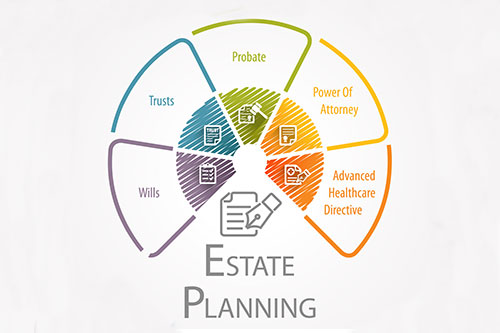
Protect What You Build
Planning is part of every aspect of life as we grow our families, prepare for retirement, and anticipate health care needs in our later years. A custom-designed estate plan ensures your wishes are carried out according to specific instructions, provides optimal tax avoidance, and makes passing your property and assets to your family easier during difficult times.
If you want to maintain control over your quality of life, your home and valuables, how you age, and protect your privacy, estate planning is the solution. You can provide your family with instructions concerning end-of-life care and medical treatments in case of medical emergencies. You can also explain how to distribute belongings to beneficiaries after you have passed.
We discuss your most significant concerns before creating estate planning documents to achieve your goals.
Five Foundational Estate Planning Documents:
Wills
A will defines the executor, or manager, of your estate who pays debts and distributes property as you have specified. Your will can address beneficiaries and guardians for minor children, as well as inform family members about your funeral and burial wishes.
Revocable Living Trusts
A revocable living trust also distributes assets and property during your lifetime and converts to an irrevocable trust after your death. It doesn’t have to go through probate if it’s well-designed and routinely updated. Property is distributed at death privately, without public court interference.
Transferring assets into a revocable living trust or irrevocable trust changes the ownership, adjusts asset values, and can minimize or eliminate taxes. Trusts are used for a variety of estate planning goals, including asset protection from lawsuits and creditors.
Advance Directives
A health care power of attorney lets you choose someone you know and trust to make medical decisions for you when you are not able and remains in effect until you recover. Guided by your living will, this person can instruct health care professionals regarding care and treatment in specific situations and ensure family members understand your wishes.
Financial Powers of Attorney
A financial power of attorney designates a person to act in your place for financial matters. The durable financial power of attorney stays in effect even if you are able to handle your affairs. This document removes the need and expense for family members to appoint a guardian if you become incapacitated.
Probate & Trust Administration
Many people become involved with administering an estate at some point. They may be named the personal representative (executor) of an estate, the trustee of a trust, or beneficiary or heir of an estate.
Probate
For will-based estate plans, probate covers the entire legal process necessary to settle a person’s estate after death. The appointed representative (usually a family member) opens the probate case in court. With the court’s help, they work through all the financial business their loved one left behind.
Trust Administration
For trust-based estate plans, your designated trustee manages the trust and distributes assets, outside of probate court, to your heirs after your death. A trustee has a fiduciary duty to account for trust assets and expenses, notices and reports, and distributions made according to the terms of the trust.
The Process
Our firm can take you through the steps of probate and trust administration by helping with the following:
- Notifying beneficiaries, heirs, and creditors of the estate administration
- Inventorying and appraising estate assets
- Reviewing claims filed by creditors
- Paying approved claims
- Selling assets if the estate lacks liquidity
- Preparing and paying estate taxes
- Distributing assets to beneficiaries and heirs
We guide personal representatives and trustees in administering estates appropriately.
Special Needs Trusts
Special needs trusts, also called supplemental needs trusts, are irrevocable trusts created to benefit a loved one with physical or mental disabilities. They have unique conditions to accommodate the specific circumstances and lifestyle of a person with special needs. These trusts also ensure your loved one doesn’t jeopardize eligibility for government benefits due to increased assets.
Guardianship
A guardian agrees to take on the responsibility of a person’s health and wellbeing or financial and property matters of their estate. The need for guardianship arises when a person becomes incapacitated by illness, injury, or declining health with age.
For minors, their parents are guardians until they reach adulthood. However, if a child with special needs won’t be able to make their own legal and medical decisions as an adult, the parents should begin guardianship proceedings before they turn 18.
An experienced elder law or special needs planning attorney can help you make critical decisions, file a petition, gather medical records, and represent you in guardianship proceedings.
Attorney Elizabeth S. Thuenen has experience helping clients protect valuable assets in Arizona. Foundation Law Arizona offers a range of services in estate planning and elder law services, including special needs, Medicaid planning, guardianship, probate and estate administration, as well as business law, real estate law, and tax law.
Contact us for a free 30-minute consultation to learn more about our estate planning and elder law services in Arizona.
